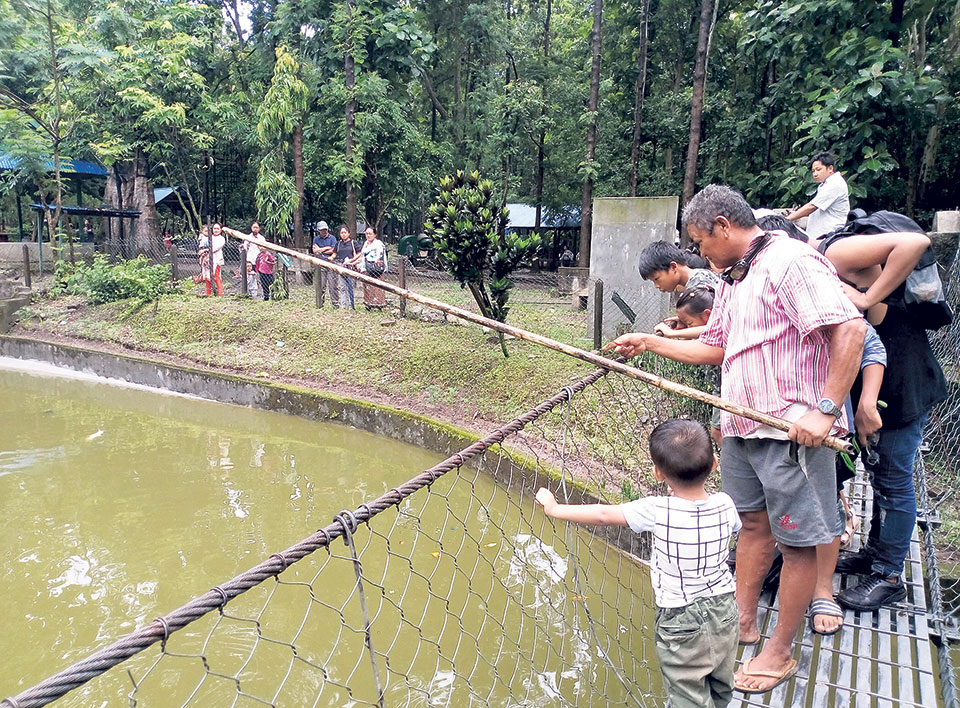That morning, under the sway of wintry wind, as Kuber, who was now twenty-five, watched his village from the peak of a deserted hill crawling towards the village, something stirred inside his restless heart: he had to die.
It was four in the morning, and the village was still asleep. The chickens’ cluckings, however, had already started to assert themselves along the tearing dawn. He watched with an intensifying pain in his heart, for he knew he would never again see his village, the village where he had first opened his eyes, where he had grown up, where he was acquainted with everything and everyone, the village that failed to embrace him no matter how much he tried.
A scarred vulture perched on his thin, almost breaking bones of his shoulder. Its claws pressed hard as if it were those very claws that were holding his bones together. Kuber had met the vulture in this very deserted hill of the village. The hill was abandoned for these very creatures. They had killed many people in the past. They were so huge that they could carry a human body. But, Kuber, when he was only fifteen, had come to this hill. He had only whispered the mantra that the vultures had started to fly in a circle, and one had come and perched on his shoulder, and ever since that they have been together, though nobody in the village knows that Kuber has a vulture, and nobody has seen him with a vulture perched in his shoulder.
Kuber sat still, watching his village. The vulture’s head tilted in coordination with his, and when it looked in his eyes, its eyes appeared sorrowful and melancholic, as if it were remembering the days when it was once a human.
Kuber was the son of the wealthiest father in the village. His father, Kaila, a man in his mid-forties, the head of the village, was the richest man around. He had lands spread across hills and fields and seven children to his name; four sons and three daughters. Kuber was the eldest. It was this very reason that Kaila expected a lot from him, which is a common thing in society. That you expect your eldest son to pave the path for your other children. And if the eldest turns out to be a waste, the society has its own logic there, that is, the other children too will be a waste.
Kuber was very poor at studies, and he rarely attended classes. His mother had died a month after giving birth to his younger sibling. And his father never married, though the village did insist Kaila to marry for the better of the children. Kuber always longed for his mother, who he thought would listen to everything his heart wanted to say.
Kuber was around ten. It was then, at that age, that it first happened. That day, as he was heading to school, something pulled him into the jungle. A man who had gone to bring wood for the stove found him chanting mantras beneath the ancient trees. The man had reported the unusual thing to Kuber’s father.
A wave of gossip took over the village that day. “The headman’s eldest is touched by spirits. Or madness,” some said. One said, “I once saw him near the cremation, staring into god knows what.” “Me too, I saw him sitting there in a meditative posture, but I had only neglected this because I blamed my poor sight, but yes, it was him, now I can clearly say this,” said an old man with a stern tone, slightly afraid.
Forest guard fire aerial shots to disperse timber smugglers

That night, with disappointment, Kaila asked his son, “Were you really there in the jungle, chanting mantras as they are saying?” Kuber didn’t utter a word. His father asked again, and again the silence followed.
“Doesn’t your brother go to school with you?” Kaila questioned his other childrens who were innocently staring at them. The one less than a year in age to Kuber nodded no. “Where does he go then?” asked his father.
All the children were sent to school. Everyone did fine, except Kuber. He didn’t care much for books or classrooms. Most days, he’d tell his younger siblings, “Go on, I’ll come,” and they’d nod and walk ahead. But Kuber wouldn’t come. He’d disappear into the jungle instead, wandering for hours. Then, just before school ended, he’d return to the main path and walk home with them, pretending like he’d been there all along, just to make sure his father never found out.
His father scolded him harshly that night, saying he was supposed to set an example for his siblings, that life would only get better through education, that this mantra and shaman is nothing but an illusion one lives in.
Kuber nodded to his father, saying, “ I won’t do it again, Buwa.” His father hugged him, patted with love on his shoulder. “Now go and sleep,” he said to his children with a smile. Kaila’s disappointment had dissolved away.
Though Kuber obeyed the words of his father that night, he was time and again haunted by visions. He would dream of living in caves, chanting mantras, and healing people with them. Sometimes, the impulses would be so powerful, that he would sneak out from his home at nights, gather the materials that a shaman needs which he had hid in the jungle, and let out his mantras.
Alone in the woods, far from the gossiping eyes of others who dismissed his actions as nonsense, and from the disappointment of his father, he would find himself in the ancient pine tree, chanting mantras which he wouldn’t remember the day after.
That morning, before the sky began to bleed its first light, the village below looked peaceful—too peaceful to ever understand a heart like his. Kuber whispered a final mantra beneath his breath. The vulture shifted, tightening its claws, as if understanding what was to follow next.
He descended the hill for the last time. Not to return home. Not to say goodbye.
But to visit the ancient tree where he had chanted alone all those years, hidden from everyone. The air was heavier there. The bark of the tree was etched with symbols only he could see, symbols only he could read. He began his chant. His voice, now deeper and more weathered than it had been in his boyhood, vibrated through the forest. The wind stilled. Even the birds refused to sing.
From the shadows, the spirits came. Some took the shape of smoke, others of eyes gleaming between branches. They encircled him, listening.
And then, a voice—deep, ancient, sorrowful—spoke in a language older than memory.
“To walk among the spirits, you must leave the flesh behind. You must leave your name. Your people. Your father.”
Kuber stood still. He thought of his father—of Kaila’s proud voice breaking that night when he’d said, “This mantra and shaman is nothing but an illusion.” Of the disappointment that still echoed in those words, and of the hug that had followed.
He thought of his siblings—who would wake up that morning, ask where their brother had gone. Who might search for days, never knowing he had walked willingly into silence.
He wept. The vulture spread its wings. With one final breath, Kuber whispered, “I understand.”
The air around him shimmered, and his body arched back, as though the spirits were unraveling him from the inside. Pain gripped him—not of flesh, but of memory being wrenched from bone. He could feel his name slipping. His father’s fading voice.
And then—nothing. When the villagers searched for him, they found nothing but a circle of feathers beneath the ancient pine, and in the distance, a lone vulture flying higher than any had seen before, circling endlessly.
And those who passed by the jungle at night, sometimes swore they heard a voice—soft, sorrowful—chanting beneath the trees.
But no one ever dared to go in.




































